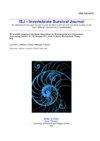Dermal, histological anomalies with variations in enzyme activities of the earthworms Lampito mauritii and Drawida willsi after short term exposure to organophosphate pesticides
IF 1.2
4区 农林科学
Q4 IMMUNOLOGY
引用次数: 5
Abstract
Monocrotophos and glyphosate are two potent organophosphate pesticides used on agricultural farms in India to control insect pests and weeds, respectively. Consistent application of these chemicals poses a risk of residual soil contamination with possible adverse implications on non-target organisms, like earthworms. The present study evaluates the impacts of these pesticides on the skin, muscles and certain biochemical parameters such as protein content, lipid peroxidation (LPX) level, activities of lactate dehydrogenase (LDH), acetylcholinesterase (AChE) and catalase (CAT) of two tropical earthworms Drawida willsi and Lampito mauritii. Monocrotophos at 1.0, 2.0, 3.0 g/kg soil and glyphosate at 0.1, 0.15, 0.2 g/kg soil were used for the experiment. At high concentrations, both pesticides induced lesions and skin undulation in the earthworms. In L. mauritii, the postclitellar region indicated muscle disorganization with high concentrations of monocrotophos. The lowest protein level was recorded in D.willsi and L. mauritii with high concentrations of monocrotophos. L. mauritii exhibited maximum LPX at high concentrations of glyphosate. Both the earthworms indicated the least LDH activity with high pesticide concentration. Minimal AChE activity in L. mauritii was observed with a high concentration of glyphosate. A high concentration of monocrotophos inhibited CAT activity in L. mauritii. The variable response of the selected morpho-histological and biochemical parameters in the earthworms to different pesticide concentrations could be useful early warning biomarkers to evaluate soil residual toxicity.短期暴露于有机磷农药后,毛里提和德拉维达蚯蚓的皮肤、组织学异常与酶活性的变化
单效磷和草甘膦是两种有效的有机磷农药,分别用于印度的农场控制害虫和杂草。持续使用这些化学品会造成残留土壤污染的风险,并可能对蚯蚓等非目标生物产生不利影响。本研究评价了农药对两种热带蚯蚓皮肤、肌肉及蛋白质含量、脂质过氧化(LPX)水平、乳酸脱氢酶(LDH)、乙酰胆碱酯酶(AChE)和过氧化氢酶(CAT)活性等生化指标的影响。试验采用1.0、2.0、3.0 g/kg土壤用量的单效磷和0.1、0.15、0.2 g/kg土壤用量的草甘膦。在高浓度下,这两种杀虫剂都能引起蚯蚓的损伤和皮肤波动。在L.毛里求斯,阴蒂后区域表明肌肉组织紊乱与高浓度的单氯磷。单效磷浓度高时,鼠毛鼠和毛鼠的蛋白质水平最低。在高浓度草甘膦条件下,L. mauritii表现出最大的LPX。两种蚯蚓在高农药浓度下LDH活性最低。高浓度草甘膦处理下,毛利草乙酰胆碱酯酶活性极低。高浓度的单效磷对毛里苔的CAT活性有抑制作用。蚯蚓的形态组织学和生化参数对不同农药浓度的变化响应可作为评价土壤残留毒性的早期预警生物标志物。
本文章由计算机程序翻译,如有差异,请以英文原文为准。
求助全文
约1分钟内获得全文
求助全文
来源期刊

ISJ-Invertebrate Survival Journal
IMMUNOLOGY-ZOOLOGY
CiteScore
2.10
自引率
0.00%
发文量
0
审稿时长
>12 weeks
期刊介绍:
Invertebrate Survival Journal (ISJ) is an international and open access journal devoted to prompt and innovative studies on the basic defense mechanisms in invertebrates, in particular with a view to identifying biotechnologies able to act against derived diseases and related economic damage.
Contributions will be mainly in the form of Letters to the Editor, Visions and Perspectives, Short Communications, Technical Reports, Research Reports, Review, Minireview and Reports of Meetings. Letters to the Editor can be commentaries or perspectives on invertebrate defence mechanisms or replies to the data published in ISJ.
 求助内容:
求助内容: 应助结果提醒方式:
应助结果提醒方式:


